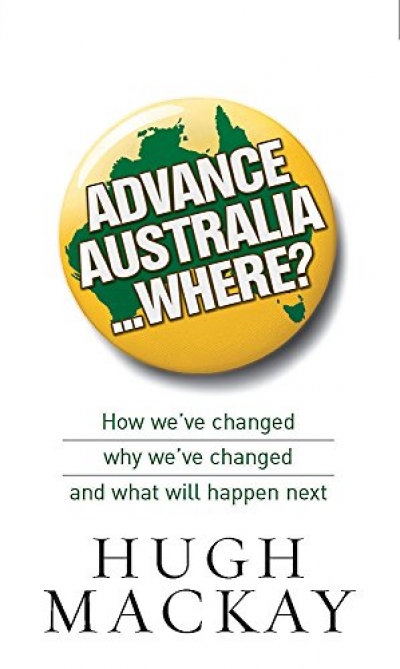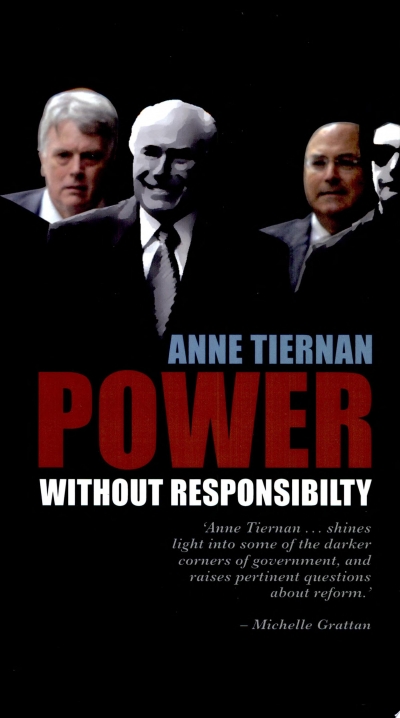Australian Politics
Tolerance, Prejudice and Fear by Christos Tsiolkas, Gideon Haigh and Alexis Wright
Tolerance, Prejudice and Fear comprises a trio of essays commissioned by the Sydney PEN. According to its website, PEN is ‘an association of writers devoted to freedom of expression in Australia’. In this book, three major Australian authors discuss the roles that tolerance, prejudice and fear have played in contemporary Australian society. This is a society in which traditional ideas about national identity and race have been variously championed and attacked. The result is thought-provoking and engrossing.
The text opens with Christos Tsiolkas’s essay on tolerance. Tsiolkas argues that it is no coincidence that a liberal ‘politics of tolerance’ has become popular during an historical period in which neo-conservatism has flourished. Gideon Haigh follows with an essay on the cultural ‘narcissism’ that swept through Australia during John Howard’s eleven years as prime minister. During this period, Haigh argues, Australian culture became ‘shallow, thick-skinned, aloof from the world’s problems, impervious to the sufferings of others – then retracting in angry confusion at the hint of questioning, raging petulantly when crossed …’ The third piece is Alexis Wright’s analysis of the harmful and infectious nature of fear. This is a topic that both Tsiolkas and Haigh raise at different points in their essays. Wright argues that Anglo-Australians have long been socialised to fear ‘Aboriginal people and … law’, while a ‘fearfulness of white Australia’ has arisen within Aboriginal culture. Wright concludes her piece by arguing that literary fiction can offer an effective mode of political resistance in a period when both major political parties in Australia are essentially singing the same neo-conservative tune.
... (read more)Howard’s Fourth Government by Chris Aulich and Roger Wettenhall (eds) & Inside Kevin 07 by Christine Jackman
The Australian ritual of a federal election campaign every two or three years is one in which voters are invited to participate in hyperbole. Reality is magnified a thousand times as the actors perform a finely choreographed political quadrille while their every word and gesture are scrutinised for meaning and analysed for nuance. Yet for all the expensive and lavish hoopla that now constitutes an election campaign, Australians are a reluctant people when it comes to getting rid of governments, however short they fall in expectations. On only eleven occasions in the 107 years of federation have they opted for change.
... (read more)Leadership And The Liberal Revival: Bolte, Askin and the post-war ascendancy by Norman Abjorensen
Henry Bolte and Bob Askin were the ‘big men’ of state politics in the 1960s, when I was a young political scientist. Bolte I never met, and Askin I met only once, but I knew the latter’s deputy premier, Charlie Cutler, quite well. I grew up in northern New South Wales and throughout my life, it seemed, we had only ever had Labor governments. The premiers cycled by with an air of inevitable succession: McKell, McGirr, Cahill, Heffron, Renshaw. Yet all five had been there in 1941 when the rejuvenated Labor Party, free both of Jack Lang and the far-left opposition to him, trounced the Mair–Bruxner government at the polls. For anyone who had been through that quarter of a century, Labor’s narrow defeat in 1965 was a shock. How could it have happened?
... (read more)Now aged in her mid-seventies, the activist, artist and one-time parliamentarian Joan Coxsedge has penned her memoirs. Cold Tea for Brandy is as entertaining a read as her own varied life seems to have been. Decades of public advocacy, a firm – some would say a fixed – moral compass and an illustrator’s gift for precise impression have given Coxsedge a writing style to be admired. Her prose is brisk, simple, amusing and easy-going, laced with an old-fashioned Australian vernacular. Some readers may find the writing as anachronistic as the socialist beliefs that Coxsedge has so ardently espoused for decades. Still, the clarity of her writing flows organically from the that of her politics.
... (read more)Margaret Reynolds was a junior minister in the Hawke government. She began her career in special education, developing a passion for advocacy of the marginalised. Providing effective early childhood education for Aboriginal children in race-bound Townsville in the 1960s took not only idealism but ingenuity and guts. Juggling the needs of a young family with work and political activism, she joined grass-roots organisations such as the anti-war group Save Our Sons, One People of Australia (committed to Aboriginal welfare) and Women’s Electoral Lobby.
... (read more)Sometimes books date quickly. This is the fate of To Firmer Ground, which was published in October 2007, one month before the change of government in Canberra. Had it appeared one year earlier, or had Kevin Rudd not triumphed at the ballot box, then this book might have provided a timely critique of the policy failings of the Howard government. Six months later, with Kyoto ratified and the new parliament having apologised to the ‘stolen generations’ and amended WorkChoices in its first sitting week, this volume seems bogged in the past.
... (read more)Exit Right by Judith Brett & Poll Dancing by Mungo MacCallum
Since the November federal election, kicking John Howard while he’s down has become something of a national pastime. While Howard’s take no-prisoners-except-on-Nauru behaviour has now exposed him to gleeful mass taunting, the idea that the end of his resilient political career has instantly created a noble Australia, its citizens and institutions cleansed and renew ed, is wishful thinking. In this context, Judith Brett’s new Quarterly Essay injects some welcome clear-headedness. Brett rains blows on Howard, but she is not a Howard-hater in the counterproductive and grandiose style of, say, Phillip Adams. Instead, she takes aim at the former prime minister in a characteristically nuanced and astute way. She bridges a gap – too often in Australia, a gulf – between scholars and interested laypeople, offering prose that is accessible and lively but that avoids dumbing down complex issues.
... (read more)The Oxford Companion to Australian Politics edited by Brian Galligan and Winsome Roberts
Quite when the figurative usage of ‘companion’ as ‘a work of reference ... that is presented as a friend to be consulted with whenever needed’ came into fashion is uncertain. I well remember my first companion, the third edition of the invaluable Oxford Companion to English Literature, from my student days in the 1950s. Oxford University Press now has a large stable of companions – some seventy titles at last count – covering everything from Christian thought to jazz to baroque music. The latest addition to the Oxford stable is a doorstopper: The Oxford Companion to Australian Politics (OCAP). Together with its sister volume, The Oxford Companion to Australian History, first published in 1998, it should become an indispensable, if expensive, tome in the library of any thinking Australian.
... (read more)Advance Australia … Where?: How we’ve changed, why we’ve changed, and what will happen next by Hugh Mackay
Advance Australia … Where? is such an eye-catching pun on Australia’s national anthem that it is no wonder that it has been used, with slight variations, as the title of at least eight books and pamphlets since World War II. Such publications have tended to express an individual author’s vision for the nation. In contrast, the latest Advance Australia … Where?, written by Hugh Mackay, mainly discusses current trends in public opinion, although it includes a few cautious predictions about the future and a number of suggestions for social reform.
... (read more)Power Without Responsibility?: Ministerial staffers in Australian governments from Whitlam to Howard by Anne Tiernan
The cover says it all. The photograph comes from the Cole Inquiry, but it could be from any number of recent events. In the centre is Prime Minister John Howard, smiling without hubris, a confident leader going about the business of leadership, ready to inform the Cole Inquiry what he knew and what he was never officially told. But the prime minister is not alone. Blacked out on either side are two of his security detail: ‘fit for office’ does not begin to describe the appearance of lean efficiency of this pair of male and female minders. Just behind them are two classic minders, both more than a little tense but featured in bold colour, one with eyes up as if anticipating the show of prime ministerial confidence; the other with eyes lowered, anticipating what might go wrong. Not that it does.
... (read more)









